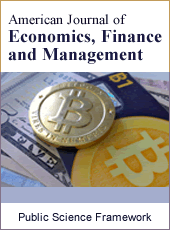American Journal of Economics, Finance and Management
Articles Information
American Journal of Economics, Finance and Management, Vol.1, No.4, Aug. 2015, Pub. Date: Jun. 8, 2015
The Analysis of the Effect of Corporate Income Tax (CIT) on Revenue Profile in Nigeria
Pages: 312-319 Views: 3964 Downloads: 4433
[01]
Adegbite Tajudeen Adejare, Department of Management and Accounting, Ladoke Akintola University of Technology, Ogbomoso, Oyo State, Nigeria.
The study empirically analyses the effect of corporate tax on revenue profile in Nigeria and also examines the impact of corporate tax revenue on economic growth in Nigeria. Secondary data were obtained from Central Bank of Nigeria Statistical Bulletin from 1993 to 2013. Multiple regressions analysis were employed to analyze the relationship between the dependent variable (Gross Domestic Product (GDP)) and independent variables (company income tax, value added tax, petroleum profit tax and inflation). It is therefore concluded that corporate income tax has positive significant impact on revenue profile in Nigeria with the Adjusted R2 of 95.3% which directly enhanced growth in Nigeria. Government derives revenue from corporate tax in discharging their obligation by providing funding for infrastructure, education and public health this invariablely enhance economic growth in Nigeria. It is recommended that government should reduce corporate tax rate rather than eliminate corporate tax in Nigeria, lower corporation tax will increase the demand for labour which in turn raises wages and increases consumption. Therefore, a reduction in the corporation tax rate will reduce the incentives to shift profits out, protecting the Corporation Tax base. Tax reductions will also increase the level of investment in the country. Furthermore, other assistance should be provided for corporations by the government to cushion the effect of corporate tax rate on the payers in Nigeria.
Company Income Tax, Exchange Rate, Economic Growth, Inflation, Revenue Profile
[01]
Alan J. A. (1986) The Economic Effects of the Corporate Income Tax: Changing Revenues and Changing Views. University of Chicago Press Volume ISBN: 0-226-26413-0 Volume URL: http://www.nber.org/books/frie86-1
[02]
Andrew Packman, Neviile Howlett, Janet Kerr (2012). Corporate income tax, a global analysis www.pwc.com?payingtaxes
[03]
Austan G. (2002). The Impact and Inefficiency of the Corporate Income Tax: Evidence from State Organizational Form Data. American Bar Foundation, and N.B.E.R.
[04]
Baranová Veronika and Janíčková Lenka (2012). Taxation of Corporations and Their Impact on Economic Growth: The Case of EU Countries. Journal of Competitiveness, Vol. 4, Issue 4, pp. 96-108, December 2012
[05]
Becker, J., Fuest, C. & Riedel, N. (2012). Corporate tax effects on the quality and quantity of FDI. European Economic Review, 56(8), 1495–1511.
[06]
Buettner, T. & Wamser, G. (2006). The Impact of Non-Profit Taxes on Foreign Direct Investment: Evidence from German Multinationals (Discussion Paper). Ifo institute and University of Munich. Retrieved April 04, 2012, from http://www.ifs.org.uk/conferences/etpf_buettner.pdf Cambridge, MA: National Bureau of Economic Research Working Paper 10509.
[07]
Davis, Steven, and Magnus Henrekson. 2004. “Tax Effects on Work Activity, Industry Mix, and Shadow Economy Size: Evidence from Rich-Country Comparisons,” Cambridge, MA: National Bureau of Economic Research Working Paper 10509.
[08]
Gaëtan Nicodème (2001). Computing effective corporate tax rates: comparisons and results. European Commission Economic Paper Number 153 June 2001 This draft: 28 May 2001.pp 1- 61 http://europa.eu.int/economy_finance
[09]
Hans Fehra, Sabine Jokischb, Ashwin Kambhampatic and Laurence J. Kotlikoffd (2012) Simulating the Elimination of the U.S. Corporate Income Tax A University of Wuerzburg, Sanderring 2, D-97070 pp 1- 40
[10]
Johansson, Å. et. al. (2008). Tax and Economic Growth (OECD Working Paper 620). Organization for Economic Cooperation and Development. Economics department.
[11]
Kimberly A. C. (2012)* In Search of Corporate Tax Incidence Tax Law Review Vol. 65: PP 433-472
[12]
Kotlán, I., Machová, Z. & Janíčková, L. (2011). Vliv zdanění na dlouhodobý ekonomický růst. Politická ekonomie, 5, 638-658.
[13]
Lanaspa, L., Pueyo, F. & Sanz, F. (2008). Foreing Direct Investment, Industrial Location, an Capital Taxation. The Annals of Regional Science, 42(2), 413-423.
[14]
Mark P. Keightley (2014). The Corporate Income Tax System: Overview and Options for Reform. December 1, 2014 Congressional Research Service 7-5700, www.crs.gov R42726
[15]
Mutti, J. & Grubert, H. (2004). Empirical Asymmetries in Foreign Direct Investment and Taxation. Journal of International Economics, 62(2), 337-358.
[16]
Olufunke Sodipo (2012) Companies Income Tax Computation And Treatment In Financial Statements. Tax manager: peak professional services in house seminar seriesno 4 peak professional services (chartered accountants Nigeria)
[17]
Professor Stephen Smith. The major taxes: economic issues (2) Corporation tax Econ7008 Economics of Tax PolicyUCL Department of Economics
[18]
Simeon Djankov, Tim Ganser, Caralee McLiesh, Rita Ramalho, Andrei Shleifer (2009). The effect of corporate taxes on investment and entrepreneurship.
[19]
Tremblay, J. F. (2010). Taxation skills investment in frictional labour markets. International Tax and Public Finance, 17(1), 52-66.
[20]
Wikipedia (2014) www.ask.com

ISSN Print: 2381-6864
ISSN Online: 2381-6902
Current Issue:
Vol. 5, Issue 3, September Submit a Manuscript Join Editorial Board Join Reviewer Team
ISSN Online: 2381-6902
Current Issue:
Vol. 5, Issue 3, September Submit a Manuscript Join Editorial Board Join Reviewer Team
| About This Journal |
| All Issues |
| Open Access |
| Indexing |
| Payment Information |
| Author Guidelines |
| Review Process |
| Publication Ethics |
| Editorial Board |
| Peer Reviewers |


